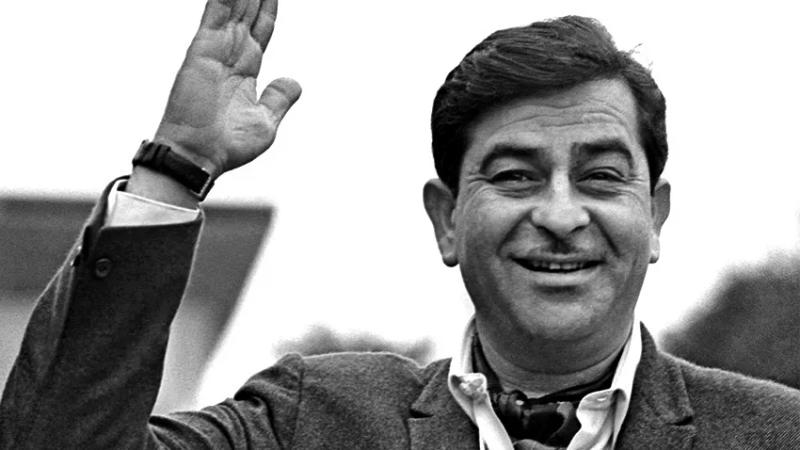Published 19:35 IST, December 14th 2024
100 Years of Raj Kapoor: Revisiting the Magic of His Timeless Classics
Explore Raj Kapoor's legendary films that shaped Indian cinema, marking his centenary with timeless classics like 'Neel Kamal' and 'Aag.'

Raj Kapoor, the legend of Indian cinema, created a body of work that remains iconic with films that hold a special place in the hearts of audiences even today.
As the country celebrates the birth centenary of the filmmaker-actor on Saturday, here is a look at some of his most celebrated films.
"Neel Kamal" (1947): Raj Kapoor debuted as a male lead in "Neel Kamal", where he portrayed a stone craft artist caught in a love triangle with two exiled princesses, played by Begum Para and Madhubala. The film was a moderate success at the box office.
It came 12 years after the actor started his career as a child artist, first appearing in his father Prithviraj Kapoor's film "Inquilab".
"Aag" (1948): "Aag", a story about a man obsessed with theatre and in search of the leading lady for his play, marked Raj Kapoor's illustrious journey behind the camera.
The film also featured his brother Shashi Kapoor as the younger version of his character, along with Nargis, Premnath, Nigar Sultana, and Kamini Kaushal.
"Barsaat" (1949): Raj Kapoor's second directorial effort solidified his stature as a filmmaker. The film's romantic saga, timeless music, and Raj Kapoor's chemistry with co-star Nargis made it a classic.
The film's popular tracks, including "Hawa Mein Udta Jaye" and "Jiya Beqarar Hai", were sung by the melody queen Lata Mangeshkar.
"Awara" (1951): One of Raj Kapoor's most remarkable films, "Awara" showcased his versatility as an actor and filmmaker. The movie is still remembered for its evergreen song "Awara Hoon", which became popular overseas, especially in China and the Soviet Union.
Raj Kapoor drew inspiration from Charlie Chaplin's Tramp persona, blending vulnerability, charm, and social commentary to reflect the struggles of the common man. The movie also featured his father, Prithviraj Kapoor.
"Shree 420" (1955): Directed by Raj Kapoor, who once again starred alongside Nargis, "Shree 420" told the story of a small-town man who comes to make it big in the city and is lured into a life of corruption and deceit when he starts working for the wealthy businessman.
The film's famous track "Mera Joota Hai Japani" highlighted themes of unemployment, poverty, and national pride, while soulful melodies like "Ramaiya Vastavaiya" and "Pyar Hua Ikrar Hua" beautifully captured the essence of love.
"Chori Chori" (1956): A romantic comedy loosely inspired by the 1934 American film "It Happened One Night", "Chori Chori" showcased Raj Kapoor's multi-faceted persona as an actor.
Songs like "Panchhi Banoon Udti Phiroon", "Yeh Raat Bheegi Bheegi", and "Us Paar Sajan" became major hits.
Mahesh Bhatt remade the film in 1991 as "Dil Hai Ki Manta Nahin", starring Pooja Bhatt and Aamir Khan.
"Jagte Raho" (1956): This critically acclaimed film, directed by Amit Maitra and Sombhu Mitra, revolved around a poor peasant, played by Raj Kapoor, who is mistaken for a thief after entering a house in search of water.
The film, also produced by Raj Kapoor, made a strong political commentary on the rich-poor divide and featured memorable songs like "Jaago Mohan Pyaare" and "Maine Jo Li Angdayi".
"Anari" (1959): A delightful romantic comedy, "Anari" earned Raj Kapoor the Filmfare Award for Best Actor for performances as an innocent man falsely accused of poisoning his landlady. Directed by Hrishikesh Mukherjee and co-starring Nutan, the film was both a commercial and critical success.
Popular tracks from the film include "Kisi Ki Muskurahaton Pe Ho", "Sab Kuch Seekha Humne", and "Woh Chand Khila".
"Sangam" (1964): Regarded as Raj Kapoor's first full-colour film, "Sangam" showcased one of his finest performances. It featured him alongside Vyjayanthimala and Rajendra Kumar in a complex love triangle.
The film's songs are timeless, with melodies like "Bol Radha Bol", "O Mehbooba" and "O Mere Sanam" beautifully capturing love and longing, while "Har Dil Jo Pyaar Karega" became an anthem for romance. "Dost Dost Na Raha" poignantly expressed heartbreak and betrayal.
"Mera Naam Joker" (1970): "Mera Naam Joker" was directed, edited, and produced by Raj Kapoor, who also played the lead role. The film was made on a massive budget and flopped badly at the box office, only to be declared a classic years later.
His son Rishi Kapoor made his debut as the younger version of his character.
Described as Raj Kapoor's dream project, it took nearly a decade to complete. Despite being a critical and commercial failure upon its release, the film later attained cult status and remains a cherished classic.
"Bobby" (1973): Raj Kapoor made a triumphant comeback with "Bobby", which became the highest-grossing film of the year. The film marked the debut of his son Rishi Kapoor in a leading role, while newcomer Dimple Kapadia starred as female lead.
The innocence and charm of the lead pair, coupled with their rebellious love story, captivated audiences.
"Ram Teri Ganga Maili" (1985): Raj Kapoor's final film as a director before his death in 1988 explored themes of purity, sacrifice, and the harsh realities of life. It featured his younger son Rajiv Kapoor opposite Mandakini.
Though a major box office hit, the film courted controversy due to some of its scenes.
Updated 19:35 IST, December 14th 2024